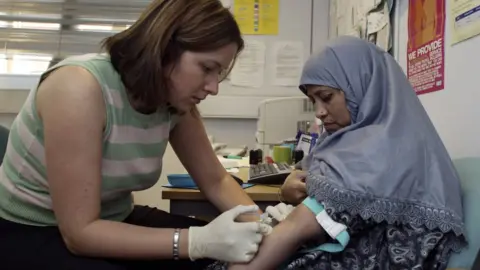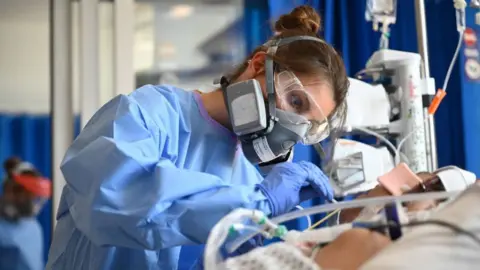GP data sharing: What is it and can I opt out?
 Getty Images
Getty ImagesA new system is planned this year to gather patient data held by GP surgeries in England, and feed it into a central NHS database.
The scheme was due to start in July, but it was recently delayed until September, over concerns from doctors' organisations that it was being pushed through too quickly.
What does the NHS want to do with GP patient data?
Under the General Practice Data for Planning and Research (GPDPR) system, information from GP surgeries in England will gathered by NHS Digital.
Information - going back over the past 10 years - will be transferred to the database.
Under the new system, data will be uploaded to the system in "near real time".
What information will be shared?
The database will collect information on patients' physical, mental and sexual health, including details of diagnoses, symptoms, test results, medication and immunisations.
It will also include data on sex, ethnicity and sexual orientation.
NHS Digital points out that this information can already be extracted from GP practices at the moment, with 300 requests made last year.
It says the new central database will mean patient information will be accessed and stored in a more consistent way.
But critics point out that approved third parties - such as researchers at universities, charities or private companies - will be able to access the data under certain circumstances.
 Getty Images
Getty ImagesCan patients opt out of the scheme, and what's the deadline?
In order to avoid any information being shared from their GP records, patients must opt out before the data transfer begins on 1 September.
If you miss this deadline, you can still opt out of further future information being shared, but data from the past 10 years may already have been taken from your medical records.
In order to opt out you must complete the "Type 1 opt-out" form and send it to your GP surgery before 1 September.
Why does the NHS want to do this?
Data about hospital patients is already collected centrally, but most of us see our GP much more frequently than we visit a hospital, and many conditions are treated in the community.
Researchers argue that being able to collect information at a national level across England could provide vital data, in turn leading to new treatments.
 Getty Images
Getty ImagesNHS Digital says that during the Covid pandemic, data from GPs helped to identify and protect the most vulnerable, roll out the vaccine programme, and identify hospital treatments which helped prevented further deaths from the disease.
It says the new system will help it plan services as it deals with the long-term impact of coronavirus.
What safeguards are in place?
The shared data does not include names and addresses - only a postcode which is replaced by a randomly generated unique code.
The NHS also says it will not collect everything in patients' written notes, such as the details of conversations with medical staff.
Information will instead be kept as what it calls "structured and coded" data.
This will only be used for planning and research purposes, and each application to use it will need approval.
Only the specific data that is required for each application will be supplied.
NHS Digital also insists the data will never be used for insurance or marketing purposes, promoting or selling products or services, market research or advertising.
However, some private sector organisations will be able to see it with permission. For example, a pharmaceutical company carrying out research that could be beneficial to the NHS patients might be allowed to access specific relevant data.
Why are people worried about the scheme?
NHS data contains highly sensitive details about patients' mental and sexual health.
Critics have called the scheme a "data grab", and there have been concerns about the type of third party organisations that might have access to the data.
Some point to US big-data company Palantir which was involved in dealing with the pandemic in the UK.
Palantir has faced criticism in the past for supplying data-sifting software to government agencies, and linked to efforts to track down undocumented migrant workers in the US.
Why has the rollout been delayed?
There have also been concerns that patients have not been given enough information about the new scheme or what it means for their data.
Doctors' organisations like the British Medical Association and the Royal College of General Practitioners argued that not enough people knew about the data transfer, or that they could opt out.
They successfully pushed for a delay until 1 September so that people could be better informed, and have time to opt out if they wish.
In 2016, a scheme called Care.data was abandoned after similar questions were raised about whether patients had received enough information about the plans.
